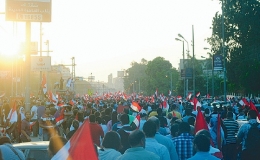Two years ago, when the Egyptian people rose against their dictatorial ruler Hosni Mubarak, the Muslim Brotherhood stood on the sidelines of the uprising, not allowing its interest in obtaining power to be evident. But almost immediately after Egypt’s own Arab Spring, you will find that the Muslim Brotherhood surfed the waves of change to emerge as the most powerful group in Egypt, largely through their backing of Mohammad Morsi, the man swept into power in last year’s presidential elections.
Two years ago, when the Egyptian people rose against their dictatorial ruler Hosni Mubarak, the Muslim Brotherhood stood on the sidelines of the uprising, not allowing its interest in obtaining power to be evident. But almost immediately after Egypt’s own Arab Spring, you will find that the Muslim Brotherhood surfed the waves of change to emerge as the most powerful group in Egypt, largely through their backing of Mohammad Morsi, the man swept into power in last year’s presidential elections.
Since then, all has not been well for anyone who is not a supporter of the Brotherhood. Social injustice, high unemployment and worsening economic conditions have caused a crumbling of the nation, and freedom of speech and women’s rights have deteriorated. One could easily predict that Egypt’s political system was on the brink of Islamisation.
During Morsi’s rule, Egypt became deeply polarised. In November 2012, he granted himself unlimited powers, including the right to legislate without judicial oversight, leaving the people of Egypt with two choices: either they would remain silent, allowing Morsi to create an Islamic republic, or they would stand united to protect their country against a totalitarian movement led by their new president.
They chose the latter. In June 2013, mass protests broke out across the country calling for Morsi to resign. According to various media reports, anywhere from 15 to 18 million people – many of whom had voted for Morsi – flooded onto the streets, chanting for freedom, human dignity and social justice. For them, Morsi had been a disappointment, cheating the populace of freedoms, and had become persona non grata in the country.
This put the Egyptian Army in an interesting position. Two years ago, when the very same army demonstrated its loyalty to the people by standing with them against Hosni Mubarak, nobody called it a coup. This time it did the very same thing, managing to handle the situation and defend the will and the rights of the majority – which, by the way, is what democracy is about, isn’t it? – against a totalitarian government that, given the chance, would have strived to establish an Islamic republic in Egypt, in which Muslims and non-Muslims alike would ultimately have suffered under a wide variety of religious restrictions.
What is different about this situation than that of the ousting of Mubarak just two short years ago? That wasn’t considered a coup. And how do we define the role of an army, anyway? Is it not to defend the well-being of the people? Is this not what the Egyptian Army – at least up to this point – has demonstrated? Is there any indication that would lead us to believe the army is imposing its own laws and regulations on the country? Is not a secular, democratic system – which the army says it is trying to establish – more protective of the rights of all citizens than archaic Islamist law? As long as the army has not reneged on its promises and not diverted its efforts from the goals of the populace – the goals of freedom, human dignity and social justice – does it not deserve praise rather than condemnation?
The defenders and promoters of the ‘coup’ theory, who to me seem to be promoting their own agendas, are insulting the people of Egypt by closing their eyes and hardening themselves against the significance of millions of citizens on streets who demanded a government founded in justice. How can millions of people be accused of involving themselves in a coup against themselves?
Hassan Faramarz is an Iranian now living in Ireland. He is the author of memoir The Flagless Ones.












